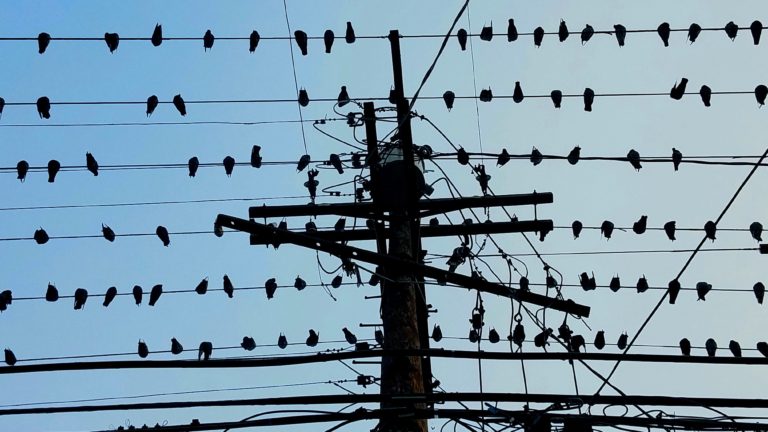Paul Smith – Fiction
By the time I was in eighth grade Mrs. Forbes’ frame acquired a concave shape, a slight hunchback that we...

Mrs. Forbes
Old Mrs. Forbes lived down the block from us in a bungalow. She lived by herself. We didn’t dislike her, we just found her odd. When the grass grew in the summer, she mowed it. When the leaves fell in the autumn, she raked them into a pile by the curb, where they burned. When it snowed, she shoveled. There was nothing odd in that. We all did what she did, but she was different. So we did what came naturally – we talked about her. We referred to her as an old maid because no man seemed to be around, except for a guy who looked to be her son, a middle-aged man who tended towards obesity. There was a card game called Old Maid, with a picture of a frumpy old woman. We likened her to that. I called her a spinster, a word I learned sometime in third grade. ‘Spinster’ had a slightly more educated tone when describing a woman that no man wanted. When my friends heard me describe her as a ‘spinster’, they were impressed.
We were not the first family in the neighborhood, a neighborhood that sprung up in the suburbs right after the war. The Trainors lived right next to her. Mrs. Forbes was here before they got here. The Rizzos lived across the street, and they could not remember a time on Keeler Avenue when Mrs. Forbes was not here. In the absence of any hard information, we started making up stories about Mrs. Forbes. She poisoned animals. She had an Ouija board. She practiced the dark arts. We would see her raking leaves and crossed the street so as not to walk by her in case she got real angry and spit at us, though no one could ever remember her spitting at anyone. In fact, no one really remembered having a conversation with her, so the story started that she was deaf. And when she was seen raking or mowing or shoveling we noticed that her lips were moving. We concluded that she was talking to ghosts. And from that point on we began to be afraid of Mrs. Forbes.
By the time I was in eighth grade Mrs. Forbes’ frame acquired a concave shape, a slight hunchback that we all marveled at because it reinforced our impression of her as someone who was old, strange and unwanted. But she kept on mowing, raking and shoveling as if nothing could stop her. ‘Nothing can outlive Mrs. Forbes’, we all said. One winter a blizzard struck us with over a foot of snow. It happened overnight. When my dad and I awoke, we broke out the shovels to clear the sidewalks and dig out the car. We looked down the block, past the empty lot between us and the Trainors to Mrs. Forbes’ bungalow, and then stared in disbelief.
The sidewalk up to her house, her front stoop, and the sidewalk across her property were all freshly shoveled, without a trace of snow. We couldn’t recall hearing the sound of a metal snow shovel scraping the concrete. And that prompted even more talk between us and the Trainors and the Rizzos and the Normans that she was not only a flat-chested, desperate old woman but probably a witch as well, most likely presiding over a coven of more witches in the basement of her bungalow, casting spells on the wind, the sky and nature in general. She would probably live to be a hundred years old, though some of us said she was already that old and would live as long as Methuselah. Dad knew someone on the police force and asked him to keep an eye on her house. The policeman laughed at dad, but from time to time we’d see a police cruiser go down Keeler Avenue with the lights off, pause a second in front of Mrs. Forbes’ house, and then slowly pull away. When dad asked his police friend if patrols were watching her occasionally, his friend said ‘no.’
One night, as a pile of leaves burned beside the curb in front of Mrs. Forbes’ bungalow, an ambulance pulled up to the front and several firemen climbed out, went to the front door and came out later with someone on a gurney – a white-haired elderly person who looked to be bony and frail. It was her. No one approached them. I wasn’t going to even though I was curious. All dad said was:
“I guess she finally kicked the bucket.”
So we talked some more and everyone said she was a fine woman who took care of her house despite being odd and not having a man and being physically unattractive and we hung our heads for a while, but then it was the holidays and we forgot about her as a ‘For Sale’ sign was put in front of her house and we all celebrated. Houses don’t sell all that well in the winter. The obese-looking man came a few times, opened the front door, stayed a bit and then left. So we talked about him and said that if he was really her son he must be odd as well and we pieced together stories about what his life was like and concluded that he probably lived alone in an apartment in the city and had cats, but no girlfriend and could not afford a new car because the jalopy he drove was nearly as old as Mrs. Forbes. And we laughed because spring was coming.
Then spring arrived.
The ‘For Sale’ sign was still up, but nobody came. Her son had stopped driving his beater over to check on her house. It was a rainy spring, one that made the grass grow thick and tall. We glanced at her house and noticed the grass was not as tall as ours and I even walked past the Trainors’ place to look. Her grass appeared to have just been mowed. None of us had heard the sound of a push mower or a gas one. By now I was in high school. I began to think she was still with us.
Later that year the sign came down, and a family moved in Mrs. Forbes’ bungalow. Their last name was Brophy. They tuck pointed the bricks, put on a new roof and painted the window frames. It was a young couple and a toddler. They pushed him around the neighborhood in a stroller and tried to start up conversations with anyone who passed their house. I avoided them. When I saw them coming I would go back inside. Dad would stay outside, mowing the lawn, trimming the bushes, washing the car. But he didn’t have much to say to them. Who would want to become friends or even acquaintances with a family that bought a haunted house? They had to know that Mrs. Forbes was a sorceress who enjoyed dismembering squirrels and chipmunks, had a son who hated her to the point of hardly ever visiting her and practiced witchcraft in her basement. And it was then, in my sophomore year of high school, that I realized we had been wrong. Once we said, ‘Nothing will outlive her.’ But our talk and speculation had outlived her, our theories of what Mrs. Forbes was really like. And I held onto that idea for over a year.
Fall came. Leaves landed on our lawns. I raked them, put them in the gutter and burned them. Without realizing who was near, I heard a voice behind me.
“You have to do that?” It was Brophy, the man who bought the Forbes place. I spun around. He looked average and even smiled at me. I wondered what he meant.
“What?”
“You rake leaves?”
“Yes.”
He smiled a cryptic, elusive smile. “We don’t. You shovel snow?”
“Yes.”
“Our snow melts. It’s funny.”
“Yeah, that’s funny,” I said.
“What about the neighbors, you know, the people living around here? The real estate guy said everyone on the block was super friendly? Is everyone round here super friendly?”
I thought for a minute. “Yeah, we are pretty friendly, I guess.”
He reached out to shake my hand. I placed my hand in his. “You’re in high school, right? Junior, senior?”
“No,” I said. “I’m in college. I’m just here for the weekend.”
“Oh,” he said, like he remembered something. “Your dad put you to work when you’re just on a visit.” Again, that smile. He tried speaking. His mouth moved, but nothing came out. Then he nodded down the street past our house, beyond the Trainors’ place to the Forbes bungalow. A whirlwind sprung up out of nowhere, sweeping up autumn’s leaves into a vortex and setting them down half a block away near Madison Street.
The back of my neck tingled. “Yeah, I really should get back to raking these leaves.”
His smile wore off and Brophy excused himself. Our smoldering leaves blew in my face. I headed inside. Dad was watching football. I had to revise my thinking again. Our ideas about Mrs. Forbes had not outlived her. She had outlived us and our whispers, probably having made a pact with something that was beyond the realm of whatever they taught at St. Lambert’s grade school and Niles East High. And not only that – she had outsmarted us, flummoxed us completely. ‘Flummox’ was another word I was proud of. We learned it studying the Trojan War when the Greeks fooled Troy with the Trojan Horse. I brushed the ashes off my sweater as I went inside. “Hey, dad,” I said. ”Mrs. Forbes is back. And this time she’s a guy.”



